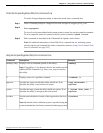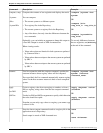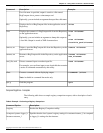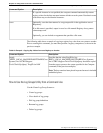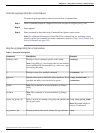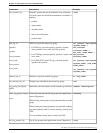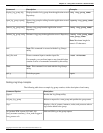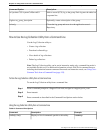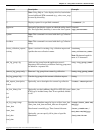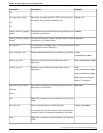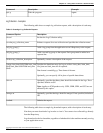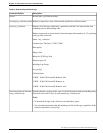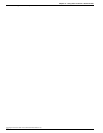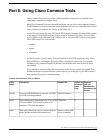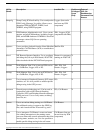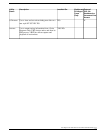
Example:Description:Command:
Note: Using Help or ? also displays this list, but includes
several additional ICM commands (e.g., echo, error_stop)
not used by this utility.
><command> /?Displays syntax for a specified command./?
>lctool
<app_servername>
Optionally Specifies the system on which the utility should
run. If not specified, the utility is run on the local system.
appserver
Note: This command is not used with the Log Collection
utility.
system
Note: This command is not used with the Log Collection
utility.
localhost
>ccolreq
<new_collection_name>
Opens a session for creating a log collection request and
specifies the new collection's name.
create_collection_request,
ccolreq
Note: Maximum length for
name is 32 characters
>alg <log_group_name>Adds one log group from the application server's
Repository into current log collection. Each log group must
be added on a separate line.
add_log_group, alg
>rmlg <log_group_name>Removes 1 log group from current log collection.remove_log_group, rmlg
>lslgLists the log groups in the current collection request.list_log_groups, lslg
>lcdesc <description>Optionally, sets a description for current log collection.add_request_description,
lcdesc
>bin /onOptionally, sets the icmBinary flag ON or OFF. ON causes
ICM logs to include binary data. If not specified, defaults
to off.
set_icm_binary, bin
/on
/off
>range /start_date mm/
dd/yyyy
Specifies the date/time range for logs to collect. /start_date,
/start_time, /end_date and /end_time are all required.
set_log_range, range
/start_date
/start_timehh:mm /
end_date mm/dd/yyyy
Date format is mm/dd/yyyy. Time format is hh:mm.
Optionally, you can specify /all in place of specific
dates/times.
/start_time
/end_date
/end_time
/end_time hh:mm
Cisco Support Tools User Guide for Cisco Unified Software Release 2.1(1)
148
Chapter 12: - Using Cisco Tools from a Command Line
How to Use the Log Collection Utility from a Command Line



